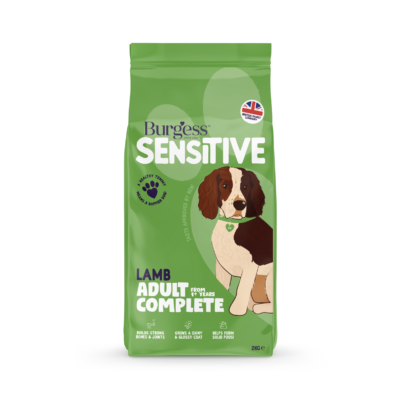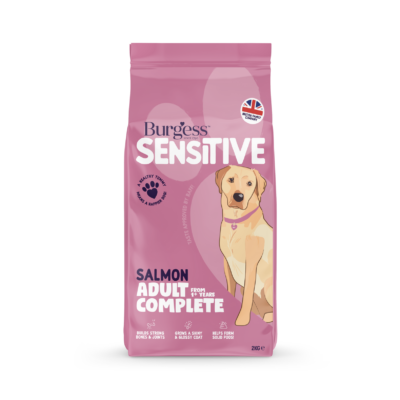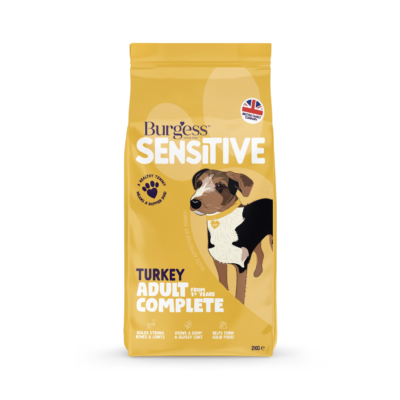
Stout, well-muscled with an unmistakable wrinkled face and steadfast expression, The Kennel Club describes the English Bulldog as an iconic British breed who is: “Alert, bold, loyal, dependable, courageous, fierce in appearance, but possessed of affectionate nature.”
Depicted by PDSA as: “Affectionate and gentle-natured dogs,” this small, thick-set breed originates from ancient dogs used for bull baiting, introduced to Britain by the Normans in the 12th Century. After this was outlawed, the English Bulldog was retained as a faithful companion dog, with The Kennel Club officially recognising the breed in 1873.
“Personable and friendly with a lively sense of humour, Bulldogs are an excellent family dog who will prove extremely loyal,” says Your Dog.
What’s the best food for an English Bulldog puppy? >>
English Bulldog health concerns
Because they are a brachycephalic (flat-faced) breed with loose-fitting skin around their head, Bulldogs can suffer from a number of health issues. These can include breathing difficulties, skin problems – including atopic dermatitis (a form of skin allergy) – eye problems, ear disorders and dental issues.
Petplan advises: “English Bulldogs have flat faces making them prone to brachycephalic obstructive airway syndrome (BOAS). Many will develop breathing problems and can require surgery. English Bulldogs are also prone to infections of the nose, throat, windpipe and lungs.”
Being aware of potential health conditions of English Bulldogs – and the costs involved in having them treated – is of paramount importance for potential owners.
“If you’re thinking about getting an English Bulldog, it’s important to consider that the breed is more likely to suffer from health conditions related to being flat faced,” adds Petplan. “While, the gentle English Bulldog makes for an excellent and lovable family pet, their needs might not be right for every lifestyle.”
What’s the best food for English Bulldogs >>
Dogs Trust advises: “Whatever the breed, all dogs need basic preventative health care like vaccinations and flea and worming treatments. You’ll also need insurance to help cover the cost of vet bills.”
Understanding what makes your English Bulldog tick will help you give them everything they need to love life! Read on to discover more about:
- ENGLISH BULLDOG PERSONALITY PROFILE
- IS MY HOME SUITABLE FOR AN ENGLISH BULLDOG?
- HOW MUCH EXERCISE DOES AN ENGLISH BULLDOG NEED?
- WHAT SHOULD I FEED AN ENGLISH BULLDOG?
- HOW MUCH GROOMING DOES AN ENGLISH BULLDOG NEED?
- WHAT’S THE BEST WAY TO TRAIN AN ENGLISH BULLDOG?
- GETTING AN ENGLISH BULLDOG
ENGLISH BULLDOG PERSONALITY PROFILE
“English Bulldogs are a lovely breed, full of character, love and personality,” enthuses rescue charity Geordie Bullies.
“English Bulldogs are loved by dog owners for their placid, docile and easy-going nature,” notes Petplan. “These gentle, welcoming dogs tend to get along with other people and pets and love nothing more than cuddles on the couch!”
“A Bulldog's personality is gentle and sweet,” adds WebMD. “They are predictable, dependable, and a great pet and protector. They seek moderate human attention and are social pets. If you are looking for a very laid-back, fun dog that keeps their mellow personality through adulthood, a Bulldog may be the right breed for you!”
For fans of the breed, it’s their easy-going nature that’s a major draw. “English Bulldogs are sociable and wonderfully laid-back characters; the breed is prized for its personality rather than their intelligence,” says Petplan.
Crate training an English Bulldog puppy – make it their special place >>
Whatever the breed, every dog is unique
While each breed has certain identifiable traits, it’s important to remember that every dog is unique.
“Just like you, every dog is an individual with their own unique personality and prior experiences. So, every English Bulldog temperament is different,” says Dogs Trust. “As dogs grow from puppies, they learn all about the world. They develop their own likes and dislikes and learn to respond to situations in different ways. For example, some dogs might like meeting other dogs, and some may not. Some might like new experiences and others may need to go slowly.”
Want just YOUR dog to come when you call them? Choose their name wisely! >>
IS MY HOME SUITABLE FOR AN ENGLISH BULLDOG?
To create a perfect canine/human partnership, it’s vital to think about what kind of energy and temperament you’d like your four-pawed friend to have so you’re a good match for each other – and that you can provide a suitable environment.
The Kennel Club recommends that English Bulldogs are quite happy in a small house with a small/medium garden in a town or country setting. My Family Vets adds: “Their restful nature makes them well suited to owners who live in flats/apartments or urban areas that don’t boast many parks and fields.”
“These laidback dogs are more than happy to relax on the sofa and adapt well to apartment living and smaller spaces; just make sure to give these couch potatoes enough exercise to avoid weight gain,” advises Petplan.
They also do best when someone is home most of the time and, while no dog should be left alone for more than four hours, will benefit from being trained that it’s OK to be on their own for short periods.
Which breed of dog is the right fit for you and the place that you live? >>
English Bulldogs with children and other pets
PDSA says: “They are very calm dogs and will get on well with other household pets if given the right socialisation when young.”
“Bulldogs are typically very mild-mannered and make for laidback, patient companions, adds My Family Vets. “They’re also good with other pets and children – providing children know how to interact with them safely.”
“This friendly breed will usually get on well with other animals, and their patience and slower way of life mean they’re great with children, even very young ones,” notes Petplan. “As with all dogs, you should always supervise playtime between your English Bulldog and children to make sure everyone is safe and happy.”
“Bulldogs are devoted and want to please their owner, but as with all breeds, early socialisation is important,” states WebMD.
“Every dog has their own unique personality that has been shaped by their own experiences of the world,” advises Dogs Trust. “They’ll have their own likes and dislikes and will respond to situations in different ways. However, there are some universal ways to behave safely around them and treat them with respect.”
The family dog – making it work for pets and children >>
HOW MUCH EXERCISE DOES AN ENGLISH BULLDOG NEED?
If you’re looking for canine companionship but prefer gentle ambles to long hikes, then a Bulldog could be a great fit for your lifestyle.
“English Bulldogs are low-maintenance when it comes to exercise and only need around 30 minutes a day,” advises Petplan. “Split walks into two 15-minute sessions to prevent overexertion.”
My Family Vets says: “They need exercise to keep them fit and healthy – just like other breeds – but over-active owners may wish to choose another breed. Because of their ‘squished’ facial anatomy, Bulldogs are not suited to intense exercise or overly long walks. Likewise, we advise walking them during cooler times of the day as Bulldogs are known to struggle in the heat.”
PDSA adds: “Bulldogs need up to an hour’s exercise daily, but it’s important to remember that they should never be exercised in the heat of the day as they are prone to overheating.”
As long walks aren’t suitable for English Bulldogs, playing games is a good way to keep their bodies moving and brains stimulated.
“English Bulldogs are very strong and a game of tug-of-war (with a dog-safe rope toy) will be right up your pet’s street and doesn’t require too much running around,” suggests Petplan. “Whilst it’s important that your English Bulldog doesn’t overexert themselves, exercise is also important to keep your dog a healthy weight.”
The insurer also notes that, due to their build, Bulldogs aren’t natural swimmers: “It’s best to avoid letting your dog in or near deep water. However, some English Bulldogs do love the water and will enjoy a paddle or spray with the hose, especially in the hotter summer months.”
How much exercise do different dog breeds need? >>
WHAT SHOULD I FEED AN ENGLISH BULLDOG?
To keep your English Bulldog healthy and happy, choosing a balanced diet that suits them and meets all their nutritional needs is essential.
“English Bulldogs can be greedy eaters, so portion control is key,” says Petplan. “Feed your pet a high-quality food and always follow the portion guidelines on the packaging.”
Burgess in-house vet, Dr Suzanne Moyes MVB MRCVS, who oversees recipe development and product production, advises: “When choosing food for English Bulldogs, it’s essential to bear in mind that the optimum diet for your dog is one that supplies the correct number of calories and balance of nutrients for their life stage and lifestyle. This means calculating the nutrient content and dietary components such as protein, fat, carbohydrate and vitamins and minerals required. All Burgess Dog Food is a complete food. This means, whatever variety you choose for your English Bulldog, it will contain all the nutrients they need in the correct balance.”
The benefits of feeding a diet specially developed for dogs prone to allergies
And, as English Bulldogs can be prone to skin allergies, choosing a food that’s specially designed for dogs with sensitivities could be beneficial.
Dr Moyes adds: “Dogs with delicate digestions or who suffer from allergies need sensitive dog food that’s made without ingredients known to cause upset tummies and skin issues. These ingredients can include beef, eggs, dairy, wheat, maize, and soya. For many canines with allergies, switching to a sensitive or hypoallergenic variety, depending on what your vet recommends, can make a world of difference to them.”
Your English Bulldog will also benefit from feeding a variety of food that’s designed to meet their nutritional requirements throughout their life. Puppies need extra energy and other nutrients to support rapid growth. For adult dogs, providing a nutritionally balanced, complete diet will help keep them in tip top condition during the prime of their life. Many older dogs develop specific conditions, such as arthritis – some of which can be eased by feeding a diet designed just for them.
Petplan adds: “English Bulldogs are slow to mature compared to other breeds and may not reach adulthood until between 18 to 24 months. Bear this in mind when moving from puppy food to adult food and consult your vet if you’re not sure.”
It’s usually recommended splitting your English Bulldog’s daily allowance into two meals. If you give your dog the occasional treat or use treats for training, remember to take this into account and reduce their daily allowance. Treats shouldn’t make up more than 10% of their daily calorie intake as this can unbalance their diet.
Human food that you should never give to dogs >>
HOW MUCH GROOMING DOES AN ENGLISH BULLDOG NEED?
With a short, fine-textured coat that comes in a whole range of colours including brindle, fawn, red, white and various combinations, English Bulldogs don’t need much brushing.
PDSA says: “They need grooming just once a week, but their facial wrinkles will need daily cleaning.”
My Family Vets adds: “A Bulldog’s coat is typically smooth and easy to maintain. Weekly brushing should suffice to keep their fur in tip-top condition. Make sure to keep the folds of skin around your Bulldog’s mouth nice and clean and dry. As with most breeds, a Bulldog will benefit from regular tooth brushing, nail clips and ear checks.”
“Some English Bulldogs’ tails sit very close to their bodies in a special groove called a tail pocket and will need regular wiping to stay clean,” advises Petplan. “Use grooming time to check your dog for skin irritation, parasites, lumps and bumps and signs of ear infections, such as black or brown wax or a strange smell.”
WHAT’S THE BEST WAY TO TRAIN AN ENGLISH BULLDOG?
When it comes to training any dog, it’s all about positive learning. Training and socialisation from a young age with different people, dogs and experiences is essential to help your English Bulldog become a confident dog, happy to go out and about.
Despite their tough appearance, English Bulldogs are sensitive souls who respond best to kind, reward-based training. Your Dog advises: “They are easily trained but do not respond well to negative behaviour or raised voices.”
However, training an English Bulldog can sometimes become a battle of wills. Petplan notes: “Known to be a wilful breed, English Bulldog owners often say their dog will pause before responding to commands, weighing up what’s in it for them! Training your English Bulldog will take patience – the breed is known for its stubborn streak. English Bulldogs’ preferred training sessions are fun, but kept short, with plenty of positive reinforcement.”
My Family Vets says: “Bulldogs’ temperament usually makes them easy to train. They’re typically sweet and devoted, eager to please their owners. Just like other breeds, we advise training a Bulldog from a young age – and using positive reinforcement when doing so.”
“Training classes are important for puppies and owners as well,” adds WebMD. “This is so they can bond, and the owner can learn how to stop bad behaviours early on. For example, Bulldogs like to play games such as tug-of-war. However, they should be taught to let go on command.”
Dogs Trust advises: “Find out what your dog loves so you can use this to reward them after a success. Whether it’s small food treats, toys or lots of praise, training with rewards is the best way for your dog to learn. As dogs are clever animals, they need suitable mental and physical exercise so that they don't get bored. Learning useful life skills such as recall, loose lead walking and settling are just as important. This ensures that you and your dog can spend enjoyable time together, both at home and out and about.”
For expert advice and practical training guidance, visit Dogs Trust Dog School >>
GETTING AN ENGLISH BULLDOG
If you’re looking to get an English Bulldog puppy, it’s essential that you only buy from a reputable breeder.
PDSA says: “If you’ve chosen to buy a puppy from a breeder, we’d recommend a member of the Kennel Club Assured Breeder scheme. These breeders must follow higher standards and therefore your puppy has a better chance of being happy and healthy. We would still recommend doing your research and make sure your pup’s parents have had all the relevant tests and screening. If you’re buying a puppy, you should use the Puppy Contract (a free toolkit to help people buy and breed puppies responsibly) to make sure you get a dog who is happy and healthy.”
The comprehensive puppy checklist >>
Alternatively, there are a number of rescue organisations around the country, includingDogs Trust and Battersea, along with breed specific rescues such as Geordie Bullies and Bulldog Rescue, who would love to hear from you.
Staff will seek to match you with the right dog for your home and lifestyle and provide you with support and useful information about the breed. By choosing a rescue English Bulldog you’ll be giving one of these loyal, loving dogs a second chance at a happy and fulfilling life.
The best breed of dog is rescue >>
Need more advice?
If you’re at all unsure about the best way of feeding your dog or have any concerns about specific nutritional requirements, ask your local veterinary practice for advice. You can also call our expert team, available 9am-5pm, Monday to Friday, on +44 (0)1405 862241 who’ll be happy to help. Alternatively, use our online contact form to get in touch.
CARE MORE Find lots of useful advice on caring for your dog from Burgess, the pet experts >>
SOMETHING TASTY FOR EVERY DOG
Every dog deserves a first-class dinner from puppy to adult and senior. Burgess Pet Care is a British, family-owned company and all our dog foods are made at our own factory in the heart of Yorkshire, using only ingredients that meet our stringent specifications – locally sourced wherever possible to support British farmers
We’ve also developed foods to meet the specific nutritional needs of sporting and working dogs, Greyhounds and Lurchers and dogs with sensitivities.
All Burgess dog food is a complete food. This means, whatever variety you choose for your dog, it will contain all the nutrients they need in the correct balance. By choosing Burgess dog food, you know you can feed your canine companion with complete confidence.
Why choose Burgess Sensitive? Because it’s super-premium nutrition for dogs with sensitive skin at an affordable price!
Burgess Sensitive is made without ingredients that are known to cause common food allergies that may lead to skin issues. Dogs tend to be allergic to proteins (meat or dairy), most commonly beef. Some dogs will be allergic to other ingredients, such as wheat, eggs and soya. That’s why none of these ingredients are included in Burgess Sensitive recipes, which are available for puppies, adult and senior dogs.
Good to know
- COMPLETE NUTRITION Each of the recipes in the Burgess Sensitive Dog Food range are complete, providing all the nutrients dogs require in the right proportions.
- PORTION CONTROL With dry food, it’s easy to measure out the right sized portion to help your dog maintain a healthy weight.
- HEALTHY AND SAFE The thorough cooking process ensures that any harmful bacteria, such as salmonella, and viruses are destroyed, and the dry food stays fresh inside the pack.
- TEETH FRIENDLY Dry dog food has the added benefit of exercising your dog’s chewing muscles and provides a mild cleaning effect on the teeth.
- MADE IN BRITAIN Crafted at Burgess Pet Care’s own factory in the heart of Yorkshire, Burgess Sensitive Dog Food contains high-quality ingredients that meet stringent specifications, locally sourced wherever possible to support British farmers.
With a whole host of *5 STAR REVIEWS*, our customers have told us:
* “Only food my puppy’s stomach can tolerate at the moment. Love this food!” * “Works well for my puppy and has made a great difference to his digestive system.” * “My doggy loves his food, and it is really good quality. Very happy with the product.” * “My dogs love it and have beautiful shiny coats.” * “My dog seems to like the senior food and it appears to have helped settle his sensitive stomach.” * “My two dogs enjoy the taste of the food. They seem happy and have more energy and bounce. Their coats are glossy and sleek. The end products are easier to pick up. After trying lots of other foods – I'm impressed.” *
Lamb? Turkey? Salmon? Your dog can try them all with our Burgess Sensitive Bundle >>
Is your dog a Burgess dog? Join the Burgess Pet Club for exclusive offers and rewards.
12 facts you may not know about Burgess Pet Care! >>
If you found this interesting, you may also like:
DOG DAYS From puppy to adolescent, through to adult and senior, as your dog goes through different stages, their exercise and nutrition needs change. Find out how to help them stay happy and healthy every day of their lives...
OPEN UP YOUR EYES TO YOUR DOG’S WORLD Understanding how your four-pawed pal interprets the world through their five senses can help you provide them with the best, most enriching life.
FUN AND GAMES IN THE DOG PARK Going to the park is the highlight of many dogs’ day as it’s a chance for canine chums to enjoy a meet and greet and dash about with their best buddies. However, not every dog-to-dog interaction goes to plan and there are definite rules of the game to be followed.
BACK TO DOG SCHOOL Training is an essential part of dog ownership and, whatever age your dog is, training should be part of their regular routine.
BEST BEHAVIOUR – HOW TO TRAIN YOUR DOG TO MAKE A POLITE HELLO Most dogs get really, really excited when they meet a friendly human on their walk – Jumping up, twirling and barking. While this can be cute when they’re a small puppy, it’s not so good when they grow into their paws and jump all over the person in question!
BACK SOON All dogs benefit from learning to manage being on their own for short periods. Otherwise, if you have to leave your dog and they aren’t used to it, it will be very stressful for them.
HOW TO TEACH YOUR DOG THAT IT’S CHILL OUT TIME Are you struggling to find your dog’s off button? While some canines are natural couch potatoes, others need a little encouragement to learn to settle down and be calm. Our expert step-by-step training plan can help.
FOOD ALLERGIES UNDER INVESTIGATION Itchy skin, upset tummy, weight loss? These can all be symptoms caused by diet. If you suspect food could be the issue, where do you start?
COULD YOUR DOG BE ALLERGIC TO YOUR HOUSE? Our four-legged friends can be allergic to all sorts of things, from chemicals in cleaning products to pollen, dust, fleas and even smoke from cooking.
DID YOU KNOW THAT OUR PETS CAN SUFFER FROM HAY FEVER TOO? While the cause of pollen allergy is the same in pets as it is in humans, the signs that your pet is suffering from hay fever can be a little different.
GIVE THE DOG A CHOICE As humans, our lives consist of choices. Yet, how much of a say do our dogs have about what they do, how they do it and when? Could letting them make their own decisions really make them happier?
DOG TRAINING MYTHS BUSTED All sorts of people have opinions on the best ways to train a canine – but it’s essential to only take advice from expert, trusted sources.
DOG BEHAVING BADLY? What’s the thing that your dog does that you find baffling, frustrating or even downright annoying? Barking at people walking past the window, ripping up the post, digging holes in the lawn, eating food out of the bin or running off with your slippers?
ARE YOU READY FOR A DOG? Taking on a dog is a huge decision. It requires money, time and commitment. Here are some of the things you’ll need to consider...
PET INSURANCE EXPLAINED Can you get pet insurance for pre-existing conditions? Can you get pet insurance for older pets? Can you get multi-pet cover? We answer some of the most commonly asked questions to help you make an informed decision about pet insurance.
PROTECT YOUR PET’S HEALTH DURING THE COST-OF-LIVING CRISIS There’s no doubt that this can be especially challenging during the current cost-of-living crisis. However, there’s lots you can do – and help is available for people and pets most in need.
FAD DIETS – SHOULD DOG OWNERS BE WORRIED? Raw, grain free or home-cooked? The range of options for feeding your dog seems to be ever expanding. But what do animal nutrition experts have to say about it?

















